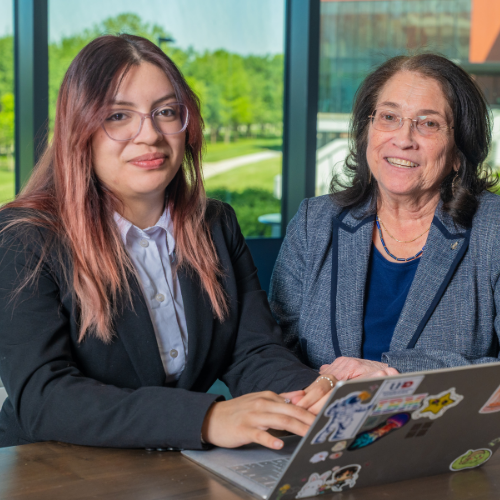Renowned for her TEDx Talks and best-selling books on courage, vulnerability, empathy, and leadership, Brené Brown, a research professor at the University of Houston, said, “Belonging is being accepted for you. Fitting in is being accepted for being like everyone else.” So it only makes sense that when college students feel like they belong—truly belong for who they are—they are more likely to want to continue their education.
Mary Jo Parker, Ed.D., Executive Director of UHD’s Scholars Academy, knows this first-hand: “As we grow ‘belongingness’ among our students, we increase retention rates.”
Creating a culture imbued with belongingness is one of the many goals of the Scholars Academy, an academically competitive program in the College of Sciences and Technology (CST) that promotes scholarship and student success for UHD undergraduate students majoring in Science, Technology, Engineering and Mathematics (STEM).
Parker and her colleagues have determined a winning formula for the Scholars Academy through a tiered-approach in mentoring undergraduates. First, there’s peer-to-peer mentorship, in which student members of Scholars Academy mentor other Scholars Academy members. This interaction is not tutoring: The peer mentors learn to guide their mentees with facilitative questions. Professor Nakamura brought this technique to UHD after the National Science Foundation piloted it.
Secondly, there are the peer mentor trainers who help prepare the peer mentors. “There's a lot of team-building that goes into this process,” said Parker, “and we meet with the peer mentors and the peer mentor trainers once a week for 15 weeks.”
“Another type of mentoring we utilize is expert-to-peer, which is faculty mentoring peer mentors and the membership through small learning communities that are discipline- based,” said Parker. “We try to put all the chemistry majors with the chemistry faculty mentor and the same with biology, computer science, etc.”
“Professor Nakamura and I also act as mentors to the entire Scholars Academy. For example, we take the peer mentors on a wilderness adventure retreat with individual challenges as well as team-building challenges—plus time for recreation,” said Parker. (Read Parker’s published article on the success of this unique approach.)
“Once our students go through this peer-leadership training, they really grow in terms of self-acknowledgement. They are able to say to themselves, ‘I have the capacity to be a leader.’ In the last four years, we have seen these students take on more leadership roles not only in the Scholars Academy, but also in the larger UHD community.”
“Leadership and mentorship really go hand in hand. They sound like separate efforts, but they aren’t,” said Parker, whose article on leadership tiers was published in the Journal of Higher Education Theory and Practice.
Finally, there’s research mentoring, which enables lower classification undergraduates to learn from the upper division undergraduates who are supporting faculty research in the lab.
Parker cites senior and Computer Science major Jessica Gonzalez as a wonderful example of how all the elements of the Scholars Academy can come together for professional development.
Gonzalez admits that as a freshman, she was completely unaware of all that UHD had to offer. In her sophomore year, she started looking into programs and scholarships and came across the Scholars Academy. “I thought, oh, I'll just apply and see if I can get in. And I got in,” said Gonzalez.
“I joined the spring semester of my sophomore year. I told my peer mentor from the beginning that I just wanted to do more. I didn’t know what I wanted to do, but I just wanted to be more involved.” He nominated her to be a peer mentor because she had completed all her requirements, which included four seminars, a field trip, and a service-learning project in the community—all on top of course work. The following fall semester she was a peer mentor to 11 students ranging from freshmen to seniors.
“As a peer mentor, we guide them, give them the support to meet the requirements. Because we know in the long term, this is to help their professional development and get them ready to step foot into their career.” Ultimately, Gonzalez was nominated and accepted to be the senior peer mentor who oversees all the peer mentors.
Her first Scholars Academy seminar on writing an abstract led to doing research with Ling Xu, Ph.D., Associate Professor of Computer Science and Engineering Technology, and going to the Great Minds in STEM Conference in Pasadena, California, with her poster presentation. It was an eye-opening experience. “I was prepared, but also unprepared. I was prepared for the research portion but unprepared for everything else, like the career fair.” The following semester she attended the Hispanic Educational Technology Services Conference in Puerto Rico.
“My junior year, when I was a peer mentor, I took a break from research and conferences to focus on my studies,” said Gonzalez. “But when I became the senior peer mentor, I was more used to that type of leadership role and on top of my studies, so I did research with Ms. Nakamura. I grew really, really close to her. I've never taken a class with her, but I don't need to have a class with her to feel like she's a mentor.”
Gonzalez attended the Great Minds in STEM Conference again, and this time she and her research partner received third place in the Computing Science section for their research on faster verification of higher-dimensional algebraic structures.
Beyond scholarship, the academically competitive program of the Scholars Academy is ultimately about student success—that is graduation and beyond—either landing a position or pursuing graduate studies. For Gonzalez, her hard work in mentoring and research paid off: This past summer she earned a prestigious internship with Northrop Grumman, a pioneer in U.S. defense technologies, in Warner Robins, Georgia.
From mentor and researcher to leader, Gonzalez leveraged her education for an important internship. Now, with that priceless work experience under her belt, Gonzalez’s future shines even brighter.

